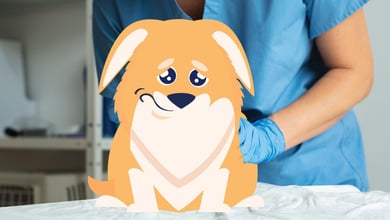Cancer in Dogs: Signs, Causes, & Treatment

Table of Contents
Although a cancer diagnosis for your furry friend can be scary, many types of dog cancer can be treated successfully. Pet parents should pay close attention to the signs of cancer in dogs, as early detection can produce better outcomes. While all pet parents benefit from staying informed on dog cancer symptoms, parents of dogs older than eight should pay special attention.
In this overview, learn the early signs, potential causes, and available treatments for cancer in dogs.
Signs & Symptoms of Cancer in Dogs
As defined by the American Kennel Club, cancer is the development of abnormal cells that can spread into tissues and create masses in dogs. Specific types of cancer may cause varying signs and symptoms. However, general dog cancer symptoms include:
- Dog cancer lumps, growths, or tumors that occur in any part of the body (not all dog cancer lumps or tumors are visible to the naked eye), including mast cell tumors
- Swollen or enlarged lymph nodes
- Unexplained weight loss
- Changes in dog's appetite or water intake
- Excessive lethargy or fatigue
- Difficulty breathing or coughing
- Persistent lameness or stiffness
- Abnormal bleeding or discharge
These symptoms do not always mean your dog has cancer. However, if you noticed any of these signs or symptoms, your dog should be seen by a veterinary doctor. BetterVet offers in-home sick visits to assess your dog's condition.
Causes of Cancer in Dogs
Cancer in dogs may be caused by a variety of potential causes, including some of which are unknown. A dog's cancer diagnosis could be a result of:
- Genetic factors (genes): certain breeds of dogs may be at an increased risk for a cancer diagnosis
- Environmental factors (exposure to carcinogens)
- Age and gender: cancer in dogs often occurs in older, senior dogs
- Diet and nutrition
Diagnosis of Dogs with Cancer
If you or your veterinary doctor suspects your dog may have cancer, they will need to run a variety of tests to confirm a diagnosis. First, your vet will need a detailed medical history and background for your dog. They might also ask you questions about your dog's behaviors or symptoms.
After a physical examination, blood tests, imaging tests (x-rays, ultrasounds, etc), or a biopsy may be recommended to help support a diagnosis.
Treatment of Cancer in Canines
Several factors determine the recommended treatment for cancer in dogs. Depending on your dog's age, sex, other medical conditions, and type of cancer, your BetterVet veterinarian will recommend appropriate measures for treating cancer for your dog. These cancer treatment options may include surgery, chemotherapy, radiation therapy, immunotherapy, or palliative care.
Pet pain management may also be an option to help make your dog more comfortable, in combination with a quality-of-life consultation.
Related reading: End of Life Care for Dogs: Everything You Can Expect
Preventing Cancer for Dogs
Every pet parent wants their furry companion to live a long and happy life. While there is no way to entirely protect your dog from cancer, preventative health measures can help reduce the risk, such as:
Regular veterinary check-ups
Annual wellness visits can help ensure your dog is up-to-date on pet vaccinations. Furthermore, preventative visits can help catch medical conditions in their early stages.
Proper nutrition and diet
A healthy, balanced diet helps support your dog's immune system and general health. During a nutritional consultation, learn the best diet to feed your furry friend based on their specific medical needs.
Exercise and weight management
Encourage your dog to stay active with lots of walks and opportunities for play. In combination with a diet full of nutrient-dense foods, exercise is vital to ensure your dog maintains healthy body weight.
Environmental management and avoidance of toxins
As a pet parent, you must ensure you dog-proof your home and keep toxic food out of reach. Also, be mindful of where your dog's environment is, as many lawn chemicals contain ingredients that can be carcinogenic.
Get a Quality-of-Life Consultation for Dogs with Cancer
Chronic diseases such as canine cancer can impact your pet's comfort and happiness. In addition to veterinary support, BetterVet offers quality-of-life consultations for aging pets or pets with cancer.
An in-home quality-of-life consultation helps support your pet's comfort on a day-to-day basis with the support of our compassionate veterinary professionals.
Learn more about how BetterVet can help support your dog with a cancer diagnosis, and book an appointment with us today!
Frequently Asked Questions
How do dogs act when they have cancer?
While every dog is different, there are a few dog cancer symptoms to look out for. Some dogs with cancer may exhibit no changes in behavior, while others may experience noticeable symptoms. A few common signs of cancer in dogs include difficulty eating or drinking, lethargy, or changes in normal behaviors.
Where does cancer usually start in dogs?
Cancer can start in several different places in a dog's body. However, the most common types of cancer in dogs are bone cancers, skin cancers, and lymphatic cancers.
How do vets check for cancer in dogs?
Methods veterinary oncologists may include to check for cancer in dogs include pet blood work, a rectal exam, urinalysis, or imaging. Recommendations will vary depending on your dog's medical history and symptoms.
Will cancer show on blood work in dogs?
Pet blood work can help support a cancer diagnosis when combined with other diagnostic methods. However, many forms of cancer in dogs may not be detectable from blood work.
What is the average age dogs get cancer?
The average age for a cancer diagnosis in dogs was around 8 to 9 years according to the National Institutes of Health. Of course, this varies depending on several factors such as gender, medical conditions, and type of dog breed.
Which dog breeds are prone to cancer?
When it comes to cancer in dogs, certain breeds are more commonly affected than others. Golden retrievers are at a higher risk for lymphoma and hemangiosarcoma. Giant breeds, such as Great Danes, Saint Bernards, and Mastiffs, are more susceptible to bone cancer. Other breeds that may be prone to cancer include Boxers, Rottweilers, Bernese Mountain Dogs, and Bulldogs.





